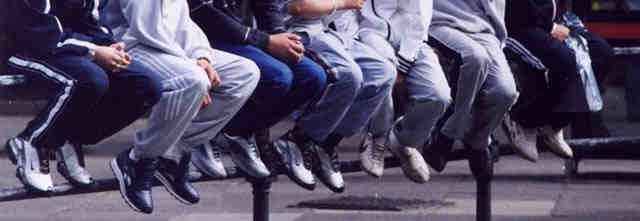Sineád Baker ¦ Deputy Online Editor
Last week, while on the DART, I was hit on the head with a biscuit. Now obviously this isn’t the worst thing that’s ever happened to me, but the action itself left me a little confused, and perhaps feeling a little vulnerable. I much prefer when someone hands me a biscuit with a smile.
I decided to turn around and examine the culprit, and saw that it was a young man of about sixteen in tracksuit. I’d like to make a distinction here; I’m not talking about a fresh-out-of the-gym tracksuit, or even the just-going-for-a-stroll type of exercise attire. Rather, I’m talking about the type of tracksuit that’s totally inappropriate for physical activity: baggy, oversized and made of thick, heavy material, with not a piece of skin-tight lycra in sight. Again, I’d care to distinguish the ‘hangover’ tracksuit, the ‘study’ tracksuit and the ‘I’m just really tired today’ tracksuit from the tracksuit that’s a uniform. This can generally be identified when we can see that someone has put in the effort to accessories said tracksuit.
I immediately hated myself for that assumption.
What struck me most about the ‘biscuit-incident’ was that I wasn’t surprised at all by the guilty party’s attire. In fact, if someone had forbidden me to turn my head, and asked me to guess what the culprit has chosen to present themselves in, (hey, it could happen, the transport police generally look quite bored), that’s exactly how I would have guessed they were dressed.
I immediately hated myself for that assumption. I’ve always presumed, and prided myself on the fact, that I’m not the type of person who judges others based on the way they decide to express themselves physically. We’d all be offended if we were branded a delinquent for wearing a hoodie, or unemployable for having a tattoo. So I swore to myself that I’d find the source of this assumption. Do we generally as a society discriminate against people in tracksuits?
It seems that maybe we do. The dressing up as a ‘chav’ or a perpetrator of antisocial behaviour is always a firm comedic favourite around Hallowe’en time. We’d be pushed to find someone who doesn’t tense up slightly when they see a group of youths in tracksuits coming towards them. Perhaps the discrimination comes in different forms; I’m yet to hear of someone being refused a job for wearing a tracksuit, as can be found in the cases of those with tattoos of mohawks, but then again it’s pretty easy to change your clothes for an interview. As a society we do generally tend to see those in tracksuits as unfavourable, and like it or not we mentally link the clothing to negative behaviour.
I decided to reflect on of my own life, and any contact I’ve ever had with ‘Antisocial Behaviour’ (someone really needs to coin a new phrase). Now this is not to say that I’m generally harassed, or that every person I see in a tracksuit has harassed me, or that I’d ever assume that every person coming towards me in a tracksuit is a diabolical social miscreant. But every episode I’ve ever been involved in or witnessed, whether it be as laughable as the ‘biscuit incident’ or more dramatic, has involved ‘youths’ (at the risk of sounding like a stereotypical grandmother) in tracksuits.
Is it right to judge people based on their clothing? I’m still going to say no.
Of course it’s awful for me to assume. Virtually every style movement has a less-than-favourable sub-culture, whether it be shaved heads or ugg boots, but that doesn’t make it politically, or morally, correct to infer from this that we can judge a person’s character based on their attire or style choices. Is it right to judge people based on their clothing? I’m still going to say no.
I’m telling myself this now, but I know next time I’m on public transport and am sandwiched between those in tracksuits, I know that I’ll stare blankly out the window, avoiding eye contact, and praying they take no notice of me. Other style movements, such as punk and goth, have managed to achieve a more favourable position in society by speaking out against any discrimination they’ve received and by continuing to be the genuine people they are behind the style you first see. Perhaps we need some tracksuits to do the same.
I don’t want to have to be convinced, to be the type of person that needs someone to tell me why I shouldn’t be prejudiced. But I’m not entirely sure what to do about it, and for now I’ll still be a little wary if I see a packet of biscuits on the DART.







